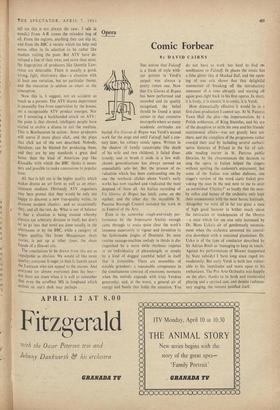Opera
Comic Forbear
By DAVID CAIRNS
THE notion that Falstaff is a freak of style with.- out portent in Verdi's output was always a pretty rotten one. Now that Un Giorno di Regno has been performed and recorded and its quality recognised, the belief should be found a quiet corner in that extensive necropolis where so many academic certitudes are buried. Un Giorno di Regno was Verdi's second work for the stage and until Falstaff, half a cen- tury later, his solitary comic opera. Written in the shadow of family catastrophe (the death of his wife and two children), it failed disas- trously; and to brush it aside in a few well- chosen generalisations has always seemed an unassailably " safe. bet. But the process of re- valuation which has been confounding one .by one the textbook clichds about Verdi's early works has now reached and vindicated the most despised of them all. An Italian recording of Un Giorno di Regno has lately come on the market; and the other day the incredible St. Pancras Borough Council included the work in its Festival of the Arts.
Even in the somewhat rough-and-ready per- formance by the Impresario Society enough came through to make quite clear the work's immense superiority in vigour and invention to the fashionable jingles of Donizetti. Its most routine sausage-machine melody in thirds is dis- tinguished by a more virile rhythmic impetus or an individuality of phraselength, or simply by a kind of dogged youthful belief in itself that is irresistible. There are ensembles of notable grandeur; a reasonable competence in the simultaneous contrast of emotions; moments when the melody expands with truly Verdian generosity; and, at the worst, a general air of energy and bustle that holds the attention. You do not have to work too hard to find re- semblances to Falstaff. In places the music has a lithe glitter like A Masked Ball, and the open- ing of one aria shows that that delightful mannerism of breaking off the introductory statement of a tune abruptly and starting off again goes right back to his first operas. In short, it is lively, it is sincere, it is comic, it is Verdi.
How dramatically effective it would be in a first-class production I cannot say. At St. Pancras Town Hall the plot—the impersonation, by a Polish nobleman, of King Stanislas, and his use of the deception to settle his own and his friends' matrimonial affairs—was not greatly here nor there, and the compilers of the programme rather overdid their zeal by including several authori- tative histories of Poland in the list of suit- able reading matter in St. Pancras public libraries. In the circumstances the decision to sing the opera in Italian helped the singers without spoiling the audience's enjoyment; but some of the Italian was rather dubious, one singer's version of the word ciarle (tales) pro- voking the man in the seat next to me to utter an astonished 'Charley?' so loudly that the near- by cellos and basses of the orchesira only kept their countenance with the most heroic fortitude. Altogether we were all in far too great a state of high good humour to bother much about the intricacies or inadequacies of the libretto —a state which for me was only increased by Dr. Hans Ucko's air of gentlemanly astonish- ment when the orchestra answered his convul- sive downbeat with a sustained pianissimo. Dr. Ucko is of the type of conductor described by Sir Adrian Boult as 'managing to keep in touch.' Against his performances of Mozart (supported by State subsidy) I have long since raged im- moderately. But early Verdi is both less vulner- able to his ineptitudes and more open to his enthusiasm. The Pro Arte Orchestra was happily , on the alert; thanks to its brisk and resourceful playing and a spirited cast, and despite rudimen- tary staging, the venture justified itself.






































 Previous page
Previous page